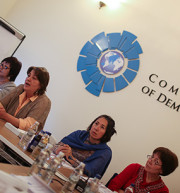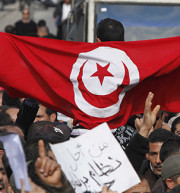
Issue No. 27 of the Assembly and Association Briefing, the newsletter of Maina Kiai, UN Special Rapporteur on the rights to freedom of peaceful assembly and of association. In this our final issue: • Kiai completes term as Rapporteur, hands over mandate to Annalisa Ciampi • A thank you message from former Special Rapporteur Maina Kiai – and news on work yet to come • Kiai launches FOAA Online! – a web-based collection of legal arguments on assembly and association rights • Special Rapporteur files interventions in South Africa and Zimbabwe cases • Venezuela: allow peaceful protests and investigate killing of demonstrators • UN experts urge Russia to drop Jehovah’s Witness lawsuit which threatens religious freedom • Russia: “Immediately release detained peaceful protesters” • UN rights experts urge lawmakers to stop “alarming” trend to curb freedom of assembly in the US • Ahead of referendum, UN experts warn Turkey about impact of purge on rights • UN experts urge United Arab Emirates: “Immediately release Ahmed Mansoor” • Belarus: expert decries of violence against protestors, demands release of all detained • Hungary urged by UN expert to reconsider new law targeting Central European University • Maina Kiai’s Testimony... Continue reading →

GENEVA – Moves by the Russian Government to ban the activities of Jehovah’s Witnesses using a lawsuit brought under anti-extremism legislation have been condemned as “extremely worrying” by three United Nations human rights experts*. “This lawsuit is a threat not only to Jehovah’s Witnesses, but to individual freedom in general in the Russian Federation,” the experts said. “The use of counter-extremism legislation in this way to confine freedom of opinion, including religious belief, expression and association to that which is state-approved is unlawful and dangerous, and signals a dark future for all religious freedom in Russia,” they stressed. The condemnation follows a lawsuit lodged at the country’s Supreme Court on 15 March to declare the Jehovah’s Witnesses Administrative Centre ‘extremist’, to liquidate it, and to ban its activity. A suspension order came into effect on that date, preventing the Administrative Centre and all its local religious centres from using state and municipal news media, and from organizing and conducting assemblies, rallies and other public events. A full court hearing is scheduled for 5 April and if the Supreme Court rules in favour of the authorities, it will be the first such ruling by a court declaring a registered centralized... Continue reading →

(русский язык) GENEVA – UN human rights experts, including Maina Kiai, are calling on the authorities in the Russian Federation to release immediately everyone arrested in peaceful demonstrations across the country on Sunday. Reports say up to one thousand peaceful demonstrators, including many young people, who took to the streets following allegations of corruption against the Prime Minister, were arrested by police who had deemed the protests unlawful. A number of these protesters were subsequently sentenced to imprisonment and fines. A group of human rights activists were also arrested and sentenced to jail after live-streaming the protests. In addition, a couple of journalists covering the demonstrations were arrested and later released. “We call on the authorities to release immediately all protesters still being detained, and to quash the sentences imposed on them,” stressed the experts. “While we welcome the release of arrested journalists, their arrest should not have taken place in the first place as this represents an attack not only on the safety of the individual journalist, but also on the public’s right to information about the protests. This right is equally hindered through the sentencing of the citizen journalists who live-streamed the events,” said the... Continue reading →

(English) Женева – Эксперты ООН в области прав человека* призывают власти Российской Федерации незамедлительно отпустить каждого, кто был задержан в рамках мирных демонстраций, которые прошли в стране в воскресенье. По сообщениям, до тысячи мирных демонстрантов, включая множество молодых людей, которые вышли на улицы после заявлений о коррумпированности премьер-министра, были арестованы полицией, считавшей протесты незаконными. Несколько таких протестующих впоследствии были приговорены к арестам и штрафам. Группа правозащитников также была задержана и приговорена к аресту по причине ведения Интернет-трансляции протестов. Кроме того, были задержаны и позднее освобождены двое журналистов, освещавших данные... Continue reading →

This page summarizes cases raised with the Russian Federation by the Special Rapporteur between May 1, 2011, (when the Special Rapporteur took up his functions) and February 28, 2017 (the date of the last public release of communications). Communications are released to the public once per year. This page also contains observations on these communications and on responses received from the Russian Federation. Communications and observations are divided into sections based upon which observation report they originally appeared. Each communication is referenced as urgent appeal (UA), allegation letter (AL), joint urgent appeal (JUA) and joint allegation letter (JAL) - the hyperlinks lead to these documents. This is followed by the date the communication was issued, as well as the case number and the State reply (also hyperlinked if available). Summaries and communications are published only in the language of submission (in the case of the Russian Federation, English). First Report (May 1, 2011 to March 15, 2012) Joint urgent appeal, 28/7/2011. Case no. RUS 8/2011. State Reply: 15/9/2011. Alleged threats and acts of intimidation against human rights defenders. Joint urgent appeal, 16/9/2011. Case no. RUS 10/2011. State Reply: 19/12/2011. Alleged arrest and detention of human rights... Continue reading →

• A day later, Nigeria flip-flops and says no protest ban for #BringBackOurGirls group (Al Jazeera). Earlier: Bring Back Our Girls demonstrations banned for “security reasons” in Abuja, Nigeria. Ban is “insane,” says protest group’s lawyer. (The Telegraph) • Using the ‘Hunger Games’ salute has taken hold as a form of protest in Thailand, after peaceful assemblies were banned. One anti-coup activists calls on people to raise “3 fingers, 3 times a day” to call for political rights (Washington Post). A military spokesman expressed concern: “If it is an obvious form of resistance, then we have to control it so it doesn’t cause any disorder in the country.” (News.com.au) • Amnesty International has released a new report on Russia “onslaught on protest.” Earlier: Human Rights Watch on the effect of Russia’s “foreign agents” law on NGOs. • Also on Russia: Manifesta – the “roving European biennial of contemporary art” – will be held in St. Petersburg this year. Its curator, Kasper König, reflects on the situation in the country: “The ink on my contract was still wet when that appalling anti-gay law was passed. It became clear to me that I was working in a country where there is no civil society.” (DW.de) • Activists launch giant balloons to protest... Continue reading →

• “Indigenous protesters in traditional headdress” clash with police in Brazil ahead of the World Cup. One officer was shot in the leg with an arrow and a ceremony to open the cup trophy exhibition was cancelled (abcnews.go.com). Photos (Daily Mail) • Thailand’s coup leader appeals for protesters to stand down: "Everyone must help me," he said, adding: but "do not criticize, do not create new problems. It's no use." (cbsnews.com) • Kenya’s police inspector general bans “political” assemblies saying "Criminals may take advantage of such gatherings” (the ban also comes just in advance of former PM Raila Odinga’s return to the country on Saturday) (nation.co.ke) • In Russia, a court orders a prominent NGO, the Memorial Human Rights Center, to register as a “foreign agent” for its human rights work. “Shameful,” says OMCT, “Is claiming rights contained under the Russian Constitution really a foreign interest?” (OMCT.org) • Maina Kiai and Community of Democracies release a set of “general principles” summarizing key aspects of civil society’s right to funding – a “rights cheat sheet” (freeassembly.net) Send news tips and suggestions, to media@freeassembly.net or check us out on Facebook and Twitter For all FOAA news roundups, click... Continue reading →

Issue No. 4 of the Assembly and Association Briefing, the newsletter of Maina Kiai, UN Special Rapporteur on the rights to freedom of peaceful assembly and of association. In this issue: • UN Releases Special Rapporteur Kiai’s latest report on groups ‘most at risk’ • Kiai joins UN experts in urging Azerbaijan to drop charges against human rights defenders • OSCE civil society says ‘political will’ a major obstacle in protecting right to funding • Three years after Tunisia: Thoughts on the rights to freedom of assembly and association from Maina Kiai • Narrowing space in Canada: A video from Maina Kiai • Freedom of association and assembly: By the numbers • Special rapporteur news in brief: April and May 2014 • World briefing: Freedom of assembly and association in the news For a link to the newsletter, click on the image at right or click here (1 MB file) or here (5.3 MB full resolution file). To subscribe to our newsletter, please drop us a line at info@freeassembly.net with the subject line “subscribe to newsletter.” For other recent newsletters, see the links below: The Assembly and Association Briefing, Vol. 1, Issue 1 (Jan. 2014) The Assembly and Association Briefing, Vol. 1, Issue 2 (Feb-March 2014) The Assembly and... Continue reading →

(WARSAW, Poland) – Political will is a major obstacle in ensuring civil society’s access to resources in many OSCE countries, according to participants in a May 7 regional dialogue organized in Warsaw by the Community of Democracies and the team of UN Special Rapporteur Maina Kiai. “It’s not a question of convincing through enough human rights laws or standards,” said one participant. Sometimes “they can’t be convinced.” The dialogue was the first event in a new two-year project focused on enhancing space for civil society and strengthening the right to access financial resources. The project was launched in February, and is being funded by the Swedish Ministry of Foreign Affairs. The May 7 Warsaw event looked at international human rights norms, standards and mechanisms to promote the right to freedom of association – and possible ways to strengthen these tools. More than 20 members of civil society from throughout the OSCE region participated. The focus on political will was central to the discussions, with one participant saying that talking about human rights norms to the government in his country was like “talking to the wall.” As a result, the road to ensuring civil society’s access to resources will require creative schemes and new ways of thinking, participants said –... Continue reading →

The Journal of Global Ethics has published an essay by Maina Kiai, in which he reflects on the first three years of his mandate, and the global state of assembly and association rights three years after protests exploded in Tunisia, sparking the Arab Spring. The essay, “Three years after Tunisia: thoughts and perspectives on the rights to freedom of assembly and association from United Nations Special Rapporteur Maina Kiai,” is available for free download to the first 50 people; subsequent access is by purchase only. Although Kiai’s mandate was created in late 2010 against the backdrop of shrinking space for civil society, a massive and growing global protest movement has grabbed most of the headlines since 2011. Kiai argues that the mandate has made a measurable impact – having helped raise awareness of repressive NGO laws, provided technical assistance to governments to strengthen assembly and association rights and developed soft law. But perhaps the most important work of the mandate, he argues, has been its contribution to a better understanding of just how important the rights to freedom of peaceful assembly and association are. “These rights satisfy people’s fundamental desire to take control of their own destinies,” Kiai writes. “They need to speak out, to work together... Continue reading →